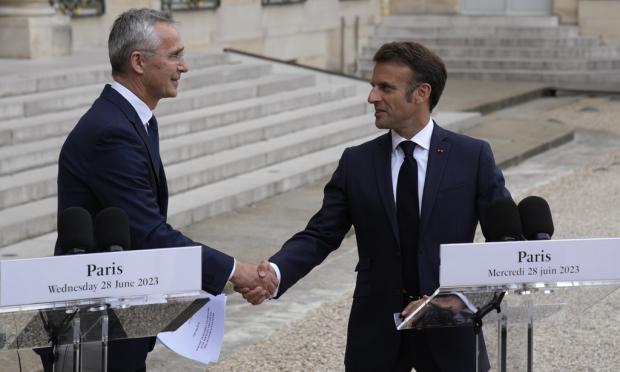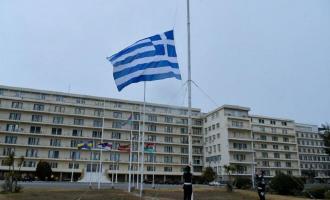NATO has no plans to send troops to Ukraine , but individual decisions by each country do not require unanimous support from all member states, NATO Secretary General Jens Stoltenberg told the AP news agency on Tuesday.
"Any decision to send NATO troops requires the unanimous support of all member countries, while individual decisions by individual countries do not require such unanimous support," Stoltenberg explained.
However, for the time being, he ruled out the possibility of NATO troops in Ukraine, saying: "NATO allies are providing unprecedented support to Ukraine. We have been doing this since 2014 and increased assistance after the widespread invasion. But there are currently no plans for NATO troops on the ground in Ukraine," as reported by news/defense
His comments on the deployment of troops explain that some Western nations may want a direct conflict with Russia. In such a scenario, French soldiers, for example, could fight Russian troops on the front lines in Ukraine, though not under the official NATO flag. The move signals that the conflict could reach a potentially new and much more dangerous phase.
While the NATO Secretary General ruled out sending troops at the Alliance level, he also noted that "this is a war of aggression by Russia against Ukraine in flagrant violation of international law."
"Under international law, Ukraine has of course the right to self-defence and we have the right to support it in defending that right," Stoltenberg continued.
He stressed that NATO, as an alliance, does not provide Ukraine with lethal weapons, but provides other forms of assistance, such as medicine, uniforms and winter equipment. However, alliance member states also send weapons and ammunition on a bilateral basis or in groups.
French President Emmanuel Macron said on Tuesday that he could not rule out sending troops to Ukraine.
"There is no consensus at this point on formally sending troops on the ground," Macron said, though he did not say which countries were considering sending troops. Ukrainian President Volodymyr Zhelensky told a news conference in Kiev on Sunday that Kiev was not in talks with its partners about deploying troops on Ukrainian territory.
Some NATO member states have been quick to deny that they will get directly involved in the conflict, but is that the case?
German Chancellor Olaf Scholz said that "there will be no ground troops, no soldiers on Ukrainian territory sent there by European or NATO states".
At a meeting on Tuesday, the prime ministers of the Visegrad Group, comprising the Czech Republic, Hungary, Poland and Slovakia, also ruled out sending troops to Ukraine.
Μακρόν: Δεν μπορούμε να αποκλείσουμε την αποστολή δυτικών στρατευμάτων στην Ουκρανία
French President Emmanuel Macron has said that sending Western troops to fight in Ukraine "cannot be ruled out" and that Paris will abandon its long-standing opposition to buying emergency artillery supplies for Ukraine from non-EU countries.
Arguing that Russia's defeat is necessary to ensure Europe's "collective security", Macron said the meeting of 25 European leaders in Paris on Monday (26 February) renewed the West's determination to help Ukraine after more than two years of full-scale war in the country.
"We will do whatever it takes to prevent Russia from winning the war," he told reporters. Asked whether sending Western troops to Ukraine was an option, Macron said the issue had been discussed at the conference. "There is no consensus today on sending official troops on the ground. But in terms of options, nothing can be ruled out," he added, without giving details of which countries were considering such a step.
Macron said the leaders agreed to create a "coalition" of countries that would discuss providing Ukraine with long-range missiles and bombs. France and the UK donated several Storm Shadow and Scalp cruise missiles last year and similar coalitions have already been formed for artillery, air defence and sea warfare.
The more aggressive stance follows Ukraine's calls for increased Western support to stem a growing barrage of Russian attacks that have led Moscow to gain territory in the east of the country after months of stalemate on the battlefield.
European countries are also increasingly concerned that the possible return of former US President Donald Trump to the White House could lead to a reduction in Washington's support for Ukraine and a weakening of America's defence pact with Europe.
There is also a sense in European capitals that Russia poses a broader threat, not just in Ukraine, and that it could even invade NATO member states in Eastern Europe. Macron voiced these concerns at the Paris conference attended by German Chancellor Olaf Scholz, Dutch Prime Minister Mark Rutte and Estonian leader Kaya Kallas, among others.
France's change of course on the purchase of ammunition is a sign that events on the battlefield have forced a rethink of policies.




